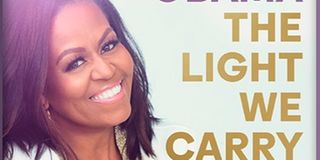Breaking News: Maai Mahiu tragedy: Death toll rises to 45
Michelle Obama’s pain of infertility and miscarriage

Former US First Lady Michelle Obama. In her memoir The Light We Carry: Overcoming in Uncertain Times, she accentuates the positive spirit that permeates in all, during ambivalent challenges.
What you need to know:
- After Barack went into summer recess and he was home and available, impregnation still evaded 29-year-old Michelle.
- Her inclination for a child was overwhelming; she and Barack passionately craved for a family.
As a little girl, Michelle LaVaughn Robinson grew exhausted of kissing the vinyl skin of her baby dolls. She pleaded with her mother, Marian Robinson, to have another baby. She assured her she'd do all the work. When her mother refuted the virginal idea, Michelle secretly hunted through her underwear drawer, searching for her birth control pills. She confiscated them, but her ploy didn't yield results.
In the spring of 1993, with improved finances, the newlywed couple Barack and Michelle Obama, moved out of Michelle's parents’ home, in 7436 South Euclid Avenue. Located in the Southside of Chicago. They bought an apartment in the picturesque Hyde Park, next to the University of Chicago.
With Barack’s encouragement, Michelle had switched vocations. She initially worked for law firm Sidley and Austin, before founding Public Allies, which helped people find their way into careers. She then moved to the non-profit, South Side Healthcare Collaborative.

Michelle's memoir The Light We Carry: Overcoming in Uncertain Times, accentuatesthe positive spirit that permeates in all, during ambivalent challenges. For long, Michelle was convinced her lack of pregnancy was simply an issue of access, the result of Barack’s comings and goings from Springfield. Where he was serving in the Illinois legislature, over a decade, before his Illinois senatorial victory.
Barack would dash back from Springfield, to predate on Michelle's ovulation window. After the Illinois legislature went into summer recess and he was home and available, impregnation still evaded 29-year-old Michelle. After years of taking careful precautions to avoid pregnancy, she was now singularly dedicated to the opposite endeavour.
Plausibility shone their way when they had one pregnancy test return positive. Which caused them both to forget every distressing thought and swoon with ecstasy, but a couple of weeks later, Michelle suffered a miscarriage.
Her inclination for a child was overwhelming; she and Barack passionately craved for a family. She had considered the new occupation at South Side Healthcare Collaborative. In part, because the healthcare benefits were improved and more accommodating to postpartum recovery than her previous vocations.
Miscarriage
The miscarriage left Michelle physically distressed and cratered any optimism her and Barack had sustained. Watching women and their children walking happily along the street, she'd feel an appetency for a child, followed by a bruising wallop of inadequacy.
Michelle acknowledges that there are numerous prospects you aren't informed in life until you experience them. Miscarriage is one of them. A miscarriage is lonely, agonising and demoralizing. She states that when you miscarry, you will likely mistake it for a personal failure, a tragedy and a feeling of introspective depressive devastation.
You become moody, irritable and feel bloated and excessively unwell. After miscarriage, the body doesn't immediately discern that you aren't pregnant, so you still encounter morning sickness. Until the body gradually adapts and the symptoms dissipate.
She emphasises that what nobody tells you is that miscarriage happens all the time, to countless women. Given the relative silence around it, she learned this only after she mentioned she had miscarried to friends. They responded by heaping her with love and support and divulging their own miscarriage tales.
Egg production
It didn’t take away the agony, but in resurrecting their own struggles, they steadied her optimism. Helping her conceptualise that what she'd been through, was no more than a normal biological inaccuracy. A fertilized egg that, for an invaluable reason, had relinquished the process. One of her friends referred Michelle to an endocrinologist (fertility doctor).
Barack and her went for an examination, and when they later corresponded with the doctor, he affirmed that there was no discernible issue with either of them. The mystery of why they weren’t pregnant would remain a conundrum. The fertility doctor suggested that Michelle should take Clomid, a drug meant to stimulate egg production.
When Clomid didn’t manifest into a pregnancy, he recommended In-Vitro Fertilization (IVF). An expensive process of retrieving an egg and combining it with a sperm to undergo embryo culture, then injecting it into the uterus.
This involved Michelle giving herself a painful regimen of daily injection shots on her thigh, over the course of several weeks. "The plan was to first administer one drug to suppress my ovaries." She writes. "Then later a new drug to stimulate them, the idea being that they’d then produce a cascade of viable eggs."
Early in the morning on July 4, 1998, after six years of desolation, retribution shone. Barack and Michelle checked into the University of Chicago Hospital. Malia Ann Obama was born. Named after Barack’s mother Ann Durham, who had passed away of ovarian cancer, on November 7, 1995.
Jeff Anthony is a novelist, a Big Brother Africa 2 Kenyan representative and founder of Jeff's Fitness Centre @jeffbigbrother




